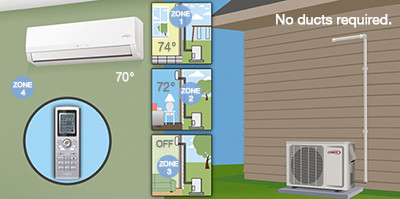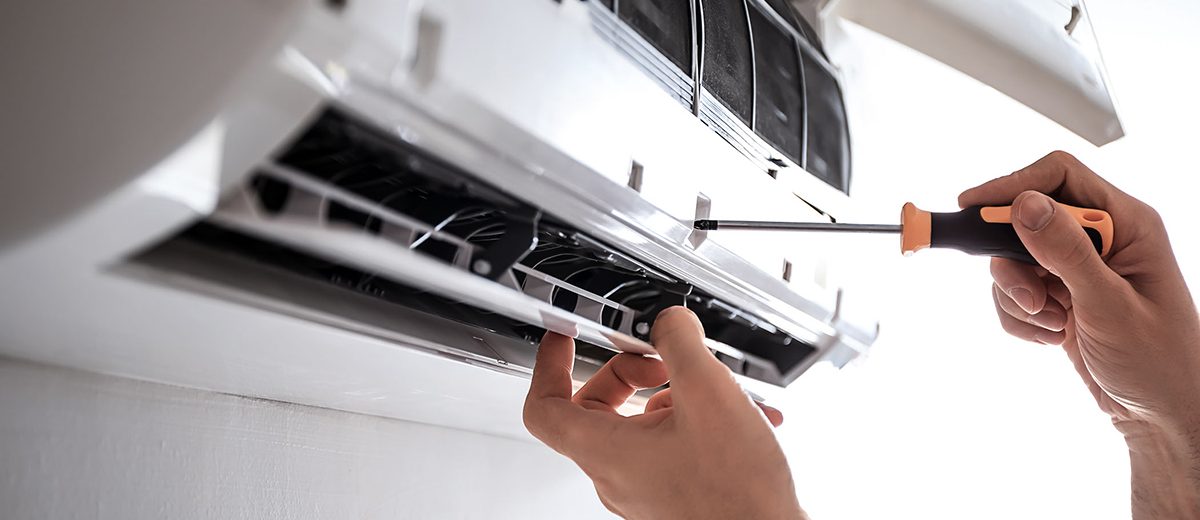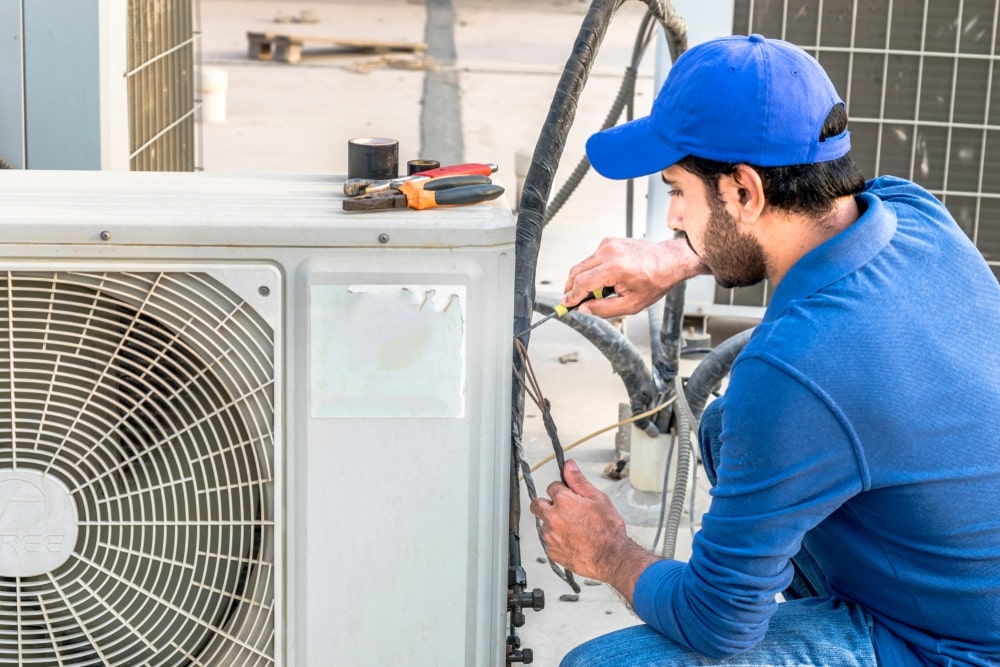Did you understand that roughly 75% of house owners experience a/c noise concerns at some time? When your air conditioning begins making odd audios, it can be rather turbulent to your tranquility and comfort.
From rattling and buzzing to squealing and banging, these sounds can show underlying problems that need interest. Recognizing the resource of the noise is crucial for effective repair services and guaranteeing your ac unit runs successfully.
So, if you're tired of putting up with irritating air conditioning noises interrupting your harmony, there are remedies available.

Key Takeaways
- Routine maintenance is necessary to address typical air conditioner noise sources like ductwork problems and malfunctioning motors.
- Address shaking sounds by examining for loose parts, maintaining fan motors, and including resonance seclusion pads.
- Squealing and banging sounds can be dealt with by examining belts, follower blades, and compressor coils for problems.
- Repair work a/c noise troubles by carrying out aesthetic inspections, applying soundproofing methods, and repairing for blockages.
Common A/c Sound Resources
If your air conditioning system is making uncommon noises, it could be because of among numerous usual sources.
One regular wrongdoer is concerns with the ductwork. Over time, ducts can create leakages, loosened links, or even clogs. These troubles can create air to flow erratically, bring about whistling or rattling noises. A comprehensive ductwork inspection by a professional can help recognize and remedy these issues, restoring your system's smooth procedure.
An additional usual source of noise in a/c systems is a damaged motor. The electric motor is an important part that drives the fans and various other moving parts within the system. If the motor is broken or harmed, it can generate grinding, screeching, or clunking sounds. In such situations, motor substitute may be required to eliminate the source of the disruption. Regular upkeep and prompt electric motor substitute when needed can help maintain your cooling system running quietly and successfully.
Detecting Rattling and Buzzing Seems
To deal with rattling and humming noises in your a/c system, start by checking the elements that could be triggering these sounds, such as loose parts or worn-out elements. Vibration isolation is key in resolving these issues. Look for any type of loose screws, bolts, or panels that might be shaking against each other throughout operation. Tightening these can commonly minimize the rattling sounds.
In addition, inspect the follower motor for any kind of signs of damage. Regular fan motor upkeep, such as lubrication and cleaning, can help in reducing buzzing sounds brought on by friction or malfunction.
If the rattling continues after checking and tightening parts, consider including resonance isolation pads or installs to soak up the excess resonances. These pads work as a barrier between the vibrating components, decreasing the noise. Bear in mind that attending to these audios immediately can prevent more damage to your air conditioning system and ensure its peak efficiency.
Attending To Screeching and Banging Noises
When resolving squealing and banging noises in your a/c system, begin by determining the resource of the sounds through a comprehensive inspection of the system's parts. Check the belt stress as well as the electric motor bearings, as loosened belts or damaged bearings can result in screeching noises. Examine the follower blade for any obstructions or problems that might create banging noises when the follower revolves. Furthermore, check out the compressor coil for any particles or problems that can be creating the sounds.
To deal with screeching noises connected to belt stress, change the stress following the manufacturer's guidelines to see to it it's within the suggested range. If the motor bearings are the culprit, think about lubricating them when possible; or else, they may need to be changed. For banging noises brought on by fan blade concerns, repair service or replace the damaged blades immediately. When it involves the compressor coil, cleaning it thoroughly can usually settle any kind of noise-related problems. By addressing these potential sources of screeching and banging noises, you can restore your a/c system to its ideal operating state.

Tips for Repairing Air Conditioning Noise
When confronted with air conditioning noise issues, begin by performing an aesthetic inspection of the system's elements for any kind of visible indications of damages or wear. Seek loosened parts, worn-out belts, or debris that may be creating the sound. If you see any type of problems, make sure to tighten up loose elements, replace harmed components, and clean out any type of debris to see if the noise improves.
To attend to cooling noise issues, think about soundproofing methods to reduce the audio transmission from the device. Protecting the walls around the device, installing soundproofing panels, or putting rubber pads beneath the device can help dampen the noise properly.
Regular maintenance is crucial to preventing air conditioning sound. Be specific that the system is tidy, lubricated, and properly maintained to lessen prospective problems. https://tufnellparkacinstallation.co.uk Repairing steps like checking the fan blades and motor for any kind of obstructions can likewise help diagnose and deal with noise problems. For small issues, DIY options such as tightening up screws or adjusting parts may resolve the noise without the demand for expert support.
Making Sure Reliable Air Conditioning Procedure
Ensure your air conditioning operates efficiently by organizing regular maintenance checks and maintaining the device clean and well-lubricated. Ensuring your air conditioning system functions at its ideal not just decreases sound but additionally lowers energy consumption. To accomplish this, implement sound reduction approaches such as placing vibration pads under the unit to wet sound transmission and making certain all elements are firmly tightened. Additionally, clean or replace air filters on a regular basis to avoid airflow clogs that can strain the system and rise noise degrees.
Energy consumption optimization is important for reliable air conditioner procedure. Set your thermostat to an appropriate temperature to stay clear of exhausting the unit. Use ceiling fans to help flow trendy air more effectively, enabling you to elevate the thermostat a little without compromising comfort. Think about mounting a programmable thermostat to adjust temperature levels automatically when you're away. By adhering to these methods, you can keep a comfortable interior setting while reducing power expenses and noise degrees.
Often Asked Inquiries
Can Air Conditioning Noise Levels Influence the Quality of Indoor Air?
High a/c noise levels can affect indoor air top quality by adding to sound pollution, which can influence your health.


To resolve this, take into consideration soundproofing services to lower the sound from your cooling unit.
Exists a Connection In Between Air Conditioning Sound and Power Effectiveness?
When it involves air conditioning noise and power effectiveness, there's without a doubt a relationship.
The loud sounds generated by your a/c unit can show ineffectiveness that result in enhanced energy usage.
By attending to and decreasing the noise pollution, you can enhance the overall efficiency of your system.
How Can I Lower Air Conditioning Sound Without Compromising the Air Conditioning Efficiency?
To decrease air conditioning sound without jeopardizing cooling efficiency, consider soundproofing remedies like acoustic insulation.
You can optimize efficiency by tuning the system for effectiveness while dampening undesirable audios.
Attempt ensuring all components are appropriately mounted and preserved, and look for loosened parts that might be triggering extreme noise.
Are There Any Kind Of Particular Regulations or Guidelines Concerning Acceptable Noise Levels for Air Conditioning Units?
When it comes to air conditioning systems, there specify policies and guidelines in place to assure compliance with appropriate noise levels. These standards assist endure a comfy environment without triggering disruptions.
Regulations regarding sound levels for cooling devices differ depending upon location, yet typically focus on lessening audio exhausts to a level that does not interfere with everyday activities. It's important to be aware of these guidelines to ensure your device satisfies the necessary requirements.
What Are Some Long-Term Maintenance Tips to avoid Cooling Noise Issues in the Future?
To prevent air conditioning noise problems long-lasting, ensure you adhere to regular maintenance. Tidy or replace filters, check for loose parts, and maintain the device tidy.
Consider soundproofing techniques like including insulation around the unit. By staying on top of maintenance and taking actions to reduce noise, you can enjoy a quieter and extra effective air conditioning system in the future.
Conclusion
Now that you have actually recognized the usual sources of a/c noise and learned exactly how to identify and repair them, you can appreciate a quieter and extra effective cooling system.
Bear in mind to consistently check for any kind of uncommon noises and resolve them quickly to avoid any further damage.
By caring for your AC unit, you can assure it runs efficiently and successfully for many years ahead.
